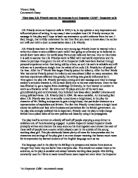How effectively does Priestly convey his message in An Inspector Calls?
An Inspector calls is a play written by J.B. Priestly, in 1946, although set in 1912, it is about a family called the Birlings. The Birlings are a wealthy family consisting of industrial Arthur Birling, his family, the fiancé Gerald Croft and an Inspector. It shows how the family each help to destroy a young woman's life-Eva Smith through their selfish and pompous attitudes which results in her death. The main character arguably is The Inspector, he makes the family reveal there own guilt whether they like it or not. The story is a thriller, but with a twist and a moral.
The play is designed to convey the state of society as Priestly saw it. He clearly criticises pompousness and complacency. The message is given at the end of the play by the Inspector in direct opposition to a speech made at the start by Mr Birling. The message is that everybody needs to be concerned with everybody else and that we have all done things wrong in the past that we should consider and make a point to avoid in the future. Before the Inspector arrives the Birlings are a rich, ignorant family they are very pleased with their lives and think themselves to be good spirited and law abiding, although they find out otherwise. The Birlings are so pleased with themselves that through the play they make comments like:
An Inspector calls is a play written by J.B. Priestly, in 1946, although set in 1912, it is about a family called the Birlings. The Birlings are a wealthy family consisting of industrial Arthur Birling, his family, the fiancé Gerald Croft and an Inspector. It shows how the family each help to destroy a young woman's life-Eva Smith through their selfish and pompous attitudes which results in her death. The main character arguably is The Inspector, he makes the family reveal there own guilt whether they like it or not. The story is a thriller, but with a twist and a moral.
The play is designed to convey the state of society as Priestly saw it. He clearly criticises pompousness and complacency. The message is given at the end of the play by the Inspector in direct opposition to a speech made at the start by Mr Birling. The message is that everybody needs to be concerned with everybody else and that we have all done things wrong in the past that we should consider and make a point to avoid in the future. Before the Inspector arrives the Birlings are a rich, ignorant family they are very pleased with their lives and think themselves to be good spirited and law abiding, although they find out otherwise. The Birlings are so pleased with themselves that through the play they make comments like:







